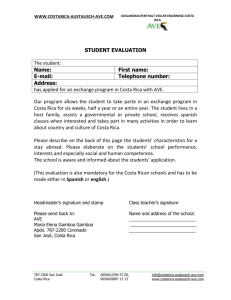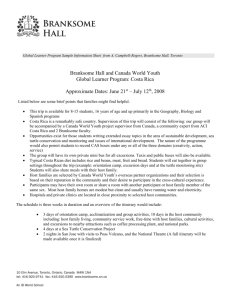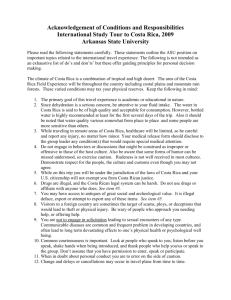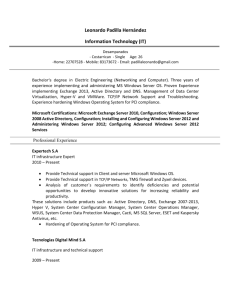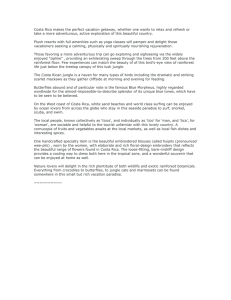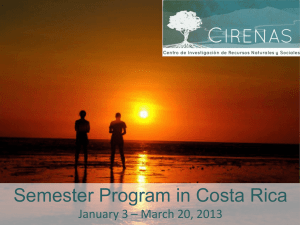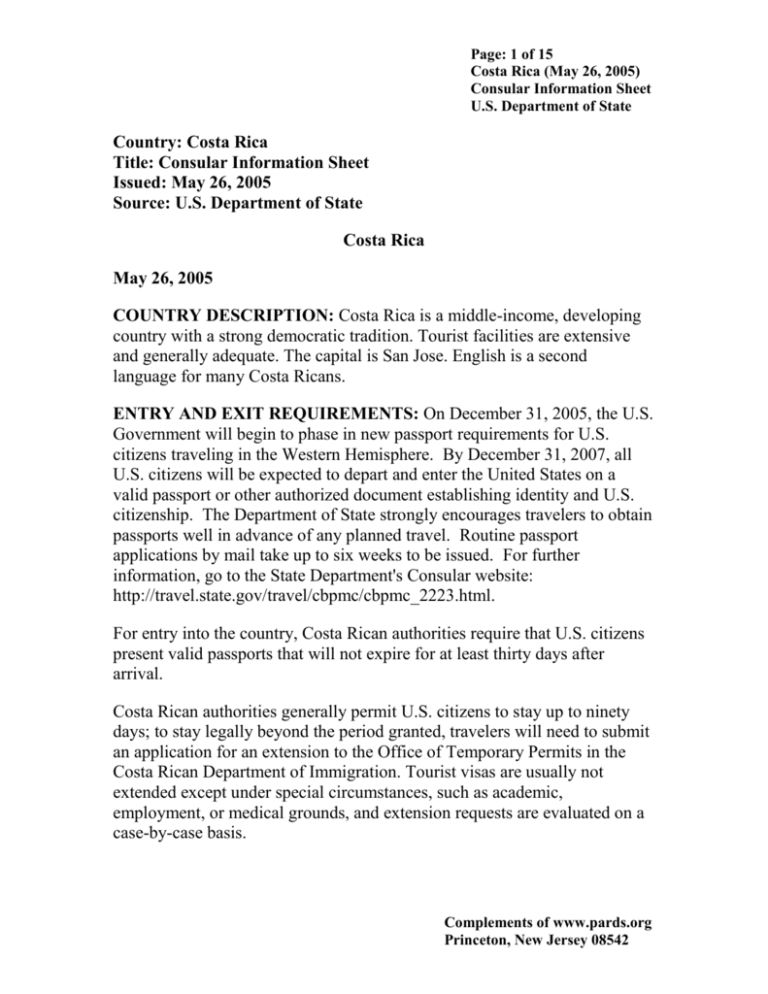
Page: 1 of 15
Costa Rica (May 26, 2005)
Consular Information Sheet
U.S. Department of State
Country: Costa Rica
Title: Consular Information Sheet
Issued: May 26, 2005
Source: U.S. Department of State
Costa Rica
May 26, 2005
COUNTRY DESCRIPTION: Costa Rica is a middle-income, developing
country with a strong democratic tradition. Tourist facilities are extensive
and generally adequate. The capital is San Jose. English is a second
language for many Costa Ricans.
ENTRY AND EXIT REQUIREMENTS: On December 31, 2005, the U.S.
Government will begin to phase in new passport requirements for U.S.
citizens traveling in the Western Hemisphere. By December 31, 2007, all
U.S. citizens will be expected to depart and enter the United States on a
valid passport or other authorized document establishing identity and U.S.
citizenship. The Department of State strongly encourages travelers to obtain
passports well in advance of any planned travel. Routine passport
applications by mail take up to six weeks to be issued. For further
information, go to the State Department's Consular website:
http://travel.state.gov/travel/cbpmc/cbpmc_2223.html.
For entry into the country, Costa Rican authorities require that U.S. citizens
present valid passports that will not expire for at least thirty days after
arrival.
Costa Rican authorities generally permit U.S. citizens to stay up to ninety
days; to stay legally beyond the period granted, travelers will need to submit
an application for an extension to the Office of Temporary Permits in the
Costa Rican Department of Immigration. Tourist visas are usually not
extended except under special circumstances, such as academic,
employment, or medical grounds, and extension requests are evaluated on a
case-by-case basis.
Complements of www.pards.org
Princeton, New Jersey 08542
Page: 2 of 15
Costa Rica (May 26, 2005)
Consular Information Sheet
U.S. Department of State
In a modification to a legal requirement that foreigners carry their passports
on their persons at all times, Costa Rican migration authorities have stated
that U.S. citizens may carry simply photocopies of the passport data page
and of the Costa Rican entry stamp on their persons, and leave the original
passport in a hotel safe or other secure place. (U.S. citizens must still,
however, present their passports for entry into and exit from Costa Rica.)
Due to the high incidence of theft of passports, travelers who do carry their
passports on them are urged to place them securely in an inside pocket, and
to keep a copy of the passport data page in a separate place to facilitate the
issuance of an emergency replacement passport.
There is a departure tax for short-term visitors. Tourists who stay over ninety
days may experience some delay at the airport. Persons who have overstayed
previously may be denied entry to Costa Rica.
In an effort to prevent international child abduction, many governments have
initiated special procedures for minors at entry and exit points. These often
include requiring documentary evidence of the child's relationship to the
accompanying parents and, if one of the parents is not traveling with the
child, permission from the non-traveling parent for the child's travel. Having
such documentation on hand may facilitate entry and departure.
Dual U.S./Costa Rican citizens are required by Costa Rican authorities to
comply with entry and exit laws that pertain to Costa Rican citizens. This
means that dual citizen children (children who hold both U.S. and Costa
Rican citizenship), who might normally travel on U.S. passports, will be
required to comply with entry and exit requirements applicable to Costa
Rican children. Some American parents may not be aware that their child
acquired Costa Rican citizenship through birth in Costa Rica or because the
other parent is Costa Rican. American parents of minors who may have
obtained Costa Rican citizenship through birth in Costa Rica or to a Costa
Rican parent should be aware that these children may only depart Costa Rica
upon presentation of an exit permit issued by the Costa Rican immigration
office. This office may be closed for several weeks during holiday periods.
Parents of dual citizen children are advised to consult with the Costa Rican
Embassy or Consulate in the U.S. about entry and exit requirements before
travel to Costa Rica. For general information about dual nationality, see the
Consular Affairs home page on the Internet at http://travel.state.gov.
Complements of www.pards.org
Princeton, New Jersey 08542
Page: 3 of 15
Costa Rica (May 26, 2005)
Consular Information Sheet
U.S. Department of State
The most authoritative and up-to-date information on Costa Rican entry and
exit requirements may be obtained from the Consular Section of the
Embassy of Costa Rica at 2112 “S” Street, N.W., Washington, D.C. 20008,
telephone (202) 328-6628, fax (202) 234-6950, or from a Costa Rican
consulate in Atlanta, Chicago, Houston, Los Angeles, Miami, New Orleans,
New York, San Juan (Puerto Rico), San Francisco, or Tampa. The Embassy
of Costa Rica also maintains a web site: http://www.costarica-embassy.org/,
as does the Costa Rican immigration agency: http://www.migracion.go.cr.
SAFETY AND SECURITY: On both the Caribbean and Pacific coasts,
currents are swift and dangerous, and there are no lifeguards or signs
warning of dangerous beaches. Several American citizens drown in Costa
Rica each year.
Adventure tourism is increasingly popular in Costa Rica, and many
companies provide white-water rafting, bungee jumping, jungle canopy
tours, deep sea diving, and other outdoor attractions. In recent years, several
Americans have died on Costa Rica's flood-swollen rivers in white-water
rafting accidents. Others have died trying to reach the mouths of active
volcanoes after being assured by tour guides that this dangerous activity is
safe. Americans are urged to use caution in selecting adventure tourism
companies, and are advised to avoid small, "cut-rate" companies that do not
have the track record of more established companies. The government of
Costa Rica has passed legislation to regulate and monitor the safety of
adventure tourism companies; enforcement of these laws is overseen by the
Ministry of Health. To be granted official operating permits, registered
tourism companies must meet safety standards and have insurance coverage.
Demonstrations or strikes, related to labor disputes or other local issues,
occur occasionally in Costa Rica. Past demonstrations have resulted in port
closures, roadblocks, and sporadic gasoline shortages. These protests have
not targeted U.S. citizens or U.S. interests, and are typically non-violent.
Travelers are advised to avoid areas where demonstrations are taking place
and to keep informed by following the local news and consulting hotel
personnel and tour guides. Additional information about demonstrations may
be obtained from the Consular Section at the U.S. Embassy, or on the
Embassy website.
Complements of www.pards.org
Princeton, New Jersey 08542
Page: 4 of 15
Costa Rica (May 26, 2005)
Consular Information Sheet
U.S. Department of State
For the latest security information, Americans traveling abroad should
regularly monitor the Department's Internet web site at
http://travel.state.gov, where the current Worldwide Caution Public
Announcement, Travel Warnings and Public Announcements may be found.
Up to date information on security can also be obtained by calling 1-888407-4747 toll free in the United States, or, for callers outside the United
States and Canada, a regular toll line at 1-202-501-4444. These numbers are
available from 8:00 a.m. to 8:00 p.m. Eastern Time, Monday through Friday
(except U.S. federal holidays).
CRIME: Crime is increasing and tourists are frequent victims. Criminals
usually operate in small groups. While most crimes are non-violent,
criminals, including juveniles, have shown a greater tendency in recent years
to use violence and to carry handguns or shoulder weapons. All criminals
should be considered armed with firearms or knives. Criminals, if
challenged or threatened, will quickly use their weapons. U.S. citizens are
encouraged to exercise the same level of caution that they would in major
cities or tourist areas throughout the world, and to be aware that the same
types of crime found elsewhere are also found here, whether of a violent
nature (e.g., robbery) or furtive (e.g., identity theft). Local law enforcement
agencies have limited capabilities and do not act according to U.S.
standards, especially outside of San Jose.
Americans should avoid areas with high concentrations of bars and
nightclubs, especially at night, and should also steer clear of deserted
properties or undeveloped land. For safety reasons, the Embassy does not
place its official visitors in hotels in the city center, but instead puts them at
the larger hotels in the outlying suburbs. Americans should walk or exercise
with a companion, and should bear in mind that crowded tourist attractions
and resort areas popular with foreign tourists are also common venues for
criminal activities. Travelers should avoid responding in kind to verbal
harassment, and should avoid carrying large amounts of cash, jewelry or
expensive photographic equipment.
In recent years, several Americans have been murdered in Costa Rica in
urban, rural and resort locations. U.S. citizens have been victims of sexual
assaults both in cities and in rural areas. In some of these cases, the victim
Complements of www.pards.org
Princeton, New Jersey 08542
Page: 5 of 15
Costa Rica (May 26, 2005)
Consular Information Sheet
U.S. Department of State
has known the assailant. There have been several sexual assaults by taxi
drivers. Travelers should be careful to use licensed taxis, which are red and
have medallions (yellow triangles containing numbers) painted on the side.
Licensed taxis at the airport are painted orange, rather than red. All taxis
should have working door handles, locks, meters (called "marias"), and
seatbelts. Passengers are required by law to wear seat belts. Passengers
should not ride in the front seat with the driver. If the taxi meter is not
working, a price should be agreed upon before the trip begins. When
traveling by bus, avoid putting bags or other personal belongings in the
storage bins. Thieves will take property from the bins when the bus makes
its periodic stops. A good rule to follow is always to have your belongings
in your line of sight or in your possession at all times.
There have been reports that unsuspecting patrons of bars and nightclubs
have been drugged and later assaulted or robbed. Americans should always
be aware of their surroundings, and should not consume food or drinks they
have left untended. Americans may find it safer to seek entertainment in
groups to help avoid being targeted, especially in urban areas.
Although unusual, there have been a number of kidnappings reported over
the past several years, including the kidnappings of Americans and other
foreigners. Some of these cases have been so-called “express kidnappings,”
in which victims are held for several hours as the kidnappers transport them
to various automated bank teller machines in an effort to take as much
money as possible from the victims' bank accounts. Carjackings have also
increased, and motorists have been confronted at gunpoint while stopped at
traffic lights or upon arrival at their homes. Late model sports utility vehicles
and high-end car models are popular with carjackers. One method of
initiating kidnappings and carjackings is to bump the victim's car from
behind; the unsuspecting victim stops, believing he or she has been involved
in a minor car accident, and is taken hostage. Americans should remain
vigilant to these types of incidents, and use caution if bumped from behind
on an isolated stretch of road.
Another common ploy by thieves involves the surreptitious puncturing of
tires of rental cars, often near restaurants, tourist attractions, airports, or
close to the car rental agencies themselves. When the travelers pull over,
"good Samaritans" quickly appear to change the tire - and just as quickly
Complements of www.pards.org
Princeton, New Jersey 08542
Page: 6 of 15
Costa Rica (May 26, 2005)
Consular Information Sheet
U.S. Department of State
remove valuables from the car, sometimes brandishing weapons. Drivers
with flat tires are advised to drive, if at all possible, to the nearest service
station or other public area, and change the tire themselves, watching their
valuables at all times. Travelers can reduce their risk by keeping valuables
out of sight, by not wearing jewelry, and by traveling in groups. Travelers
should also minimize travel after dark. Before renting a car, travelers should
ask the rental company their specific policy regarding damage to a tire or
wheel rim due to driving on a flat tire. Some rental car companies may cover
the costs of the damaged tire and wheel rim if the occupants feared for their
safety and drove to the nearest public area to change the flat tire.
Travelers should purchase an adequate level of locally valid theft insurance
when renting vehicles. One should park in secured lots whenever possible,
and should never leave valuables in the vehicle. The U.S. Embassy receives
reports daily of valuables, identity documents, and other items stolen from
locked vehicles. In many of these cases, the stolen items were hidden under
the seat, in the glove compartment, or secured in the trunk. Thefts from
parked cars commonly occur in downtown San Jose, at beaches, in the
airport and bus station parking lots, and at national parks and other tourist
attractions.
Money changers on the street have been known to pass off counterfeit U.S.
dollars and local currency. Credit card fraud (either using stolen credit cards
or the account number alone following copying of the number) is on the rise.
Travelers should retain all their credit card receipts and check their accounts
regularly to help prevent unauthorized use of their credit cards. Avoid using
debit cards for point-of-sale purchases, as a skimmed number can be used to
clean out an account.
The loss or theft abroad of a U.S. passport should be reported immediately to
the local police and to the Consular Section of the U.S. Embassy. If the
police will not accept the report, as sometimes happens when only the
passport is stolen, the traveler should in any case report the theft to the U.S.
Embassy to help avoid use by criminals or other identity theft.
U.S. citizens can refer to the Department of State's pamphlet, A Safe Trip
Abroad , for ways to promote trouble-free travel. The pamphlet is available
by mail from the Superintendent of Documents, U.S. Government Printing
Complements of www.pards.org
Princeton, New Jersey 08542
Page: 7 of 15
Costa Rica (May 26, 2005)
Consular Information Sheet
U.S. Department of State
Office, Washington, D.C. 20402; via the Internet at
http://www.gpoaccess.gov/, or via the Bureau of Consular Affairs home
page at http://travel.state.gov.
ASSISTANCE TO VICTIMS OF CRIME: Persons, who are victims of
crime while overseas, in addition to reporting to local police, should contact
the nearest U.S. Embassy or Consulate for assistance. The
Embassy/Consulate staff can help crime victims find appropriate medical
care and contact family members or friends. They can also explain how to
transfer funds from the U.S. Although the investigation and prosecution of
the crime is solely the responsibility of local authorities, consular officers
can help a victim of crime to understand the local criminal justice process
and to find an attorney if needed.
Costa Rica has a 911 system for reporting emergencies. Crimes that are no
longer in progress should be reported in person at the nearest police station.
In the event of a traffic accident, vehicles must be left where they are, and
not moved out of the way. Both the Transito (Traffic Police) and the
Insurance Investigator must make accident reports before the vehicles are
moved. Although sometimes slow to respond after notification, these
officials will come to the accident scene.
MEDICAL FACILITIES: Medical care in San Jose is adequate, but may
be more limited in areas outside of San Jose. Doctors and hospitals often
expect immediate cash payment for health services, and U.S. medical
insurance is not always valid outside the United States. A list of local
doctors and medical facilities can be found at the website of the U.S.
Embassy in San Jose, at http://usembassy.or.cr. An ambulance may be
summoned by calling 911. The best equipped ambulances are called
“unidad avanzada.”
MEDICAL INSURANCE: The Department of State strongly urges
Americans to consult with their medical insurance company prior to
traveling abroad to confirm whether their policy applies overseas and
whether it will cover emergency expenses such as medical evacuation. U.S.
medical insurance plans seldom cover health costs incurred outside the
United States unless supplemental coverage is purchased. Further, U.S.
Medicare and Medicaid programs do not provide payment for medical
Complements of www.pards.org
Princeton, New Jersey 08542
Page: 8 of 15
Costa Rica (May 26, 2005)
Consular Information Sheet
U.S. Department of State
services outside the United States. However, many travel agents and private
companies offer insurance plans that will cover health care expenses
incurred overseas, including emergency services such as medical evacuation.
When making a decision regarding health insurance, Americans should
consider that many foreign doctors and hospitals require payment in cash
prior to providing service, and that a medical evacuation to the U.S. may
cost well in excess of $50,000. Uninsured travelers who require medical care
overseas often face extreme difficulties. When consulting with an insurer
prior to a trip, ascertain whether payment will be made to the overseas
healthcare provider or whether the traveler is reimbursed later for expenses
incurred. Some insurance policies also include coverage for psychiatric
treatment and for disposition of remains in the event of death.
Useful information on medical emergencies abroad, including overseas
insurance programs, is provided in the Department of State's Bureau of
Consular Affairs brochure, Medical Information for Americans Traveling
Abroad , available via the Bureau of Consular Affairs home page.
OTHER HEALTH INFORMATION: Information on vaccinations and
other health precautions, such as safe food and water precautions and insect
bite protection, may be obtained from the Centers for Disease Control and
Prevention's hotline for international travelers at 1-877-FYI-TRIP (1-877394-8747) or via the CDC's Internet site at http://www.cdc.gov/travel.
Incidents of dengue fever and malaria are rising in Costa Rica. For
information about this and about outbreaks of infectious diseases abroad,
consult the World Health Organization's website at http://www.who.int/en.
Further health information for travelers is available at
http://www.who.int/ith.
TRAFFIC SAFETY AND ROAD CONDITIONS: While in a foreign
country, U.S. citizens may encounter road conditions that differ significantly
from those in the United States. The information below concerning Costa
Rica is provided for general reference only, and it may not be totally
accurate in a particular location or circumstance.
Costa Rica has one of the highest vehicle accident rates in the world. Even
the most experienced drivers are challenged by the disregard for traffic laws
Complements of www.pards.org
Princeton, New Jersey 08542
Page: 9 of 15
Costa Rica (May 26, 2005)
Consular Information Sheet
U.S. Department of State
and driving safety. Traffic laws and speed limits are often ignored; turns
across one or two lanes of traffic are common, and pedestrians are not given
the right of way. Although improving, roads are often in poor condition, and
large potholes with the potential to cause significant damage to vehicles are
common. Pedestrians, cyclists, and farm animals may use the main roads.
Traffic signs, even on major highways, are often inadequate. All of the
above, in addition to poor visibility because of heavy fog or rain, makes
driving at night especially treacherous. In the rainy season, landslides are
common, especially on the highway between San Jose and the Caribbean
city of Limon. All types of motor vehicles are appropriate for the main
highways and principal roads in the major cities. However, some roads to
beaches and other rural locations are not paved, and some out-of-the-way
destinations are accessible only with high clearance, rugged suspension fourwheel drive vehicles. Travelers are advised to call ahead to their hotels to
ask about the current status of access roads.
Travelers should avoid responding in kind to provocative driving behavior
or road-rage. In case of an accident, travelers are advised to remain in their
car until police arrive. Travelers are further advised to keep all doors locked
and to drive to a well-populated area before stopping to change a flat tire
(see “Crime,” above).
Costa Rican law requires that drivers and passengers wear seatbelts in all
cars, including taxis, and police are authorized to issue tickets. Traffic
enforcement in Costa Rica is the responsibility of the Transit Police
("Transitos"), who are distinguished by a light blue uniform shirt and dark
blue trousers. They use light blue cars or motorcycles equipped with blue
lights. They often wave vehicles to the side of the road for inspection.
Drivers are commonly asked to produce a driver's license, vehicle
registration and insurance information. Third-party coverage is mandatory in
Costa Rica. Infractions will result in the issuance of a summons. Fines are
not supposed to be collected on the spot, although reports of officers
attempting to collect money are common. Persons involved in vehicular
accidents are advised not to move their vehicle until instructed to do so by a
Transit Officer, who will respond to the scene together with a representative
of the National Insurance Company (known by its local acronym, INS.)
Accidents may be reported by dialing 911.
Complements of www.pards.org
Princeton, New Jersey 08542
Page: 10 of 15
Costa Rica (May 26, 2005)
Consular Information Sheet
U.S. Department of State
For additional general information about road safety, including links to
foreign government sites, see the Department of State, Bureau of Consular
Affairs home page at
http://travel.state.gov/travel/tips/safety/safety_1179.html.
AVIATION SAFETY OVERSIGHT: The U.S. Federal Aviation
Administration (FAA) has assessed the Government of Costa Rica's civil
aviation authority as Category 1 - in compliance with international aviation
safety standards for oversight of Costa Rica's air carrier operations. For
further information, travelers may contact the Department of Transportation
within the U.S. at 1-800-322-7873, or visit the FAA's Internet website at
http://www.faa.gov/avr/iasa/index.cfm.
Since 2000, several American citizens have died in domestic air accidents.
Local investigations have judged pilot error to be the cause in the majority of
the accidents. Private air taxi services have been involved in a
disproportionate number of crashes. The Government of Costa Rica's civil
aviation authority has responded by dedicating additional resources to the
oversight of the pilots, procedures, and aircraft of air taxi operators.
CUSTOMS REGULATIONS: Costa Rica customs authorities may enforce
strict regulations concerning temporary importation into or export from
Costa Rica of items such as cars, household effects, and merchandise. These
regulations can be quite complicated and include the application of local tax
laws. In addition, Costa Rican customs officials often require documentation
that has been certified by the Costa Rican Embassy/Consulate in the country
of origin. This is especially true for automobiles that are to be imported. The
Government of Costa Rica has instituted strict emissions requirements for
these cars and will not release them without an emissions statement from the
country of origin. It is advisable to contact the Embassy of Costa Rica in
Washington or one of Costa Rica's Consulates in the United States for
specific information regarding customs requirements before shipping any
items. Their website is located at http://www.costarica-embassy.org.
In many countries around the world, counterfeit and pirated goods are
widely available. Transactions involving such products are illegal and
bringing them back to the United States may result in forfeitures and/or
fines. A current list of those countries with serious problems in this regard
Complements of www.pards.org
Princeton, New Jersey 08542
Page: 11 of 15
Costa Rica (May 26, 2005)
Consular Information Sheet
U.S. Department of State
can be found at
http://www.ustr.gov/Document_Library/Reports_Publications/2005/2005_S
pecial_301/Section_Index.html.
CRIMINAL PENALTIES: While in a foreign country, a U.S. citizen is
subject to that country's laws and regulations, which sometimes differ
significantly from those in the United States, and may not afford the
protections available to the individual under U.S. law. Penalties for breaking
the law can be more severe than in the United States for similar offenses.
Persons violating Costa Rican law, even unknowingly, may be arrested,
imprisoned, fined and/or expelled.
Soliciting the services of a minor for sexual purposes is illegal in Costa Rica,
and is punishable by imprisonment. The Costa Rican government has
established an aggressive program to discourage sexual tourism and to
punish severely those who engage in sexual activity with minors. Several
U.S. citizens are serving long sentences in Costa Rica following conviction
of crimes related to sexual activity with minors. These acts are also illegal
under U.S. law, even if the act takes place abroad.
Under the PROTECT Act of April 2003, it is a crime, prosecutable in the
United States, for a U.S. citizen or permanent resident alien, to engage in
illicit sexual conduct in a foreign country with a person under the age of 18,
whether or not the U.S. citizen or lawful permanent resident alien intended
to engage in such illicit sexual conduct prior to going abroad. For purposes
of the PROTECT Act, illicit sexual conduct includes any commercial sex act
in a foreign country with a person under the age of 18. The law defines a
commercial sex act as any sex act, on account of which anything of value is
given to or received by a person under the age of 18.
Under the Protection of Children from Sexual Predators Act of 1998, it is a
crime to use the mail or any facility of interstate or foreign commerce,
including the Internet, to transmit information about a minor under the age
of 16 for criminal sexual purposes that include, among other things, the
production of child pornography. This same law makes it a crime to use any
facility of interstate or foreign commerce, including the Internet, to transport
obscene materials to minors under the age of 16.
Complements of www.pards.org
Princeton, New Jersey 08542
Page: 12 of 15
Costa Rica (May 26, 2005)
Consular Information Sheet
U.S. Department of State
Penalties for possession, use, or trafficking in illegal drugs in Costa Rica are
strict, and convicted offenders can expect lengthy jail sentences and fines. In
addition to the criminal penalties they may face, tourists who purchase or
sell illegal drugs or use the services of prostitutes greatly increase their risk
of personal harm. Several Americans have died in Costa Rica in recent years
in incidents related to drug use or patronage of prostitutes.
Under Costa Rican law, suspects in criminal cases may be held in jail until
the investigation is completed and the prosecutor is ready to proceed to trial.
This pretrial detention can last two years, and in some cases, longer.
SPECIAL ISSUES:
Borders: There have been disagreements regarding navigational rights in
the Nicaragua-Costa Rica border area. Nicaragua and Costa Rica signed a
three-year agreement in September of 2002 to defer presenting these issues
before the International Court of Justice (ICJ) for resolution. Meanwhile, the
governments of Nicaragua and Costa Rica have agreed to work towards an
amicable solution and to jointly fund community development projects in
the border area.
Land Ownership, Expropriations, Squatters, Shoreline Property: U.S.
citizens are urged to use caution when making real estate purchases, and
should consult reputable legal counsel and investigate thoroughly all aspects
before entering into a contract.
Irregular Land Registrations: Due to irregular enforcement of property
laws, investors should exercise extreme caution before investing in real
estate. There is a long history of investment and real estate scams and frauds
perpetrated against U.S. citizens and other international visitors. There have
been numerous instances of duly registered properties reverting to
previously unknown owners who have shown they possess clear title and
parallel registration.
Expropriations: A few cases remain in which U.S. citizens have yet to be
compensated for land expropriated by the government in the 1970s or 1980s.
Unexecuted expropriation claims cloud title in other cases. However,
changes to Costa Rican law in 1995 place more restrictions on the
Complements of www.pards.org
Princeton, New Jersey 08542
Page: 13 of 15
Costa Rica (May 26, 2005)
Consular Information Sheet
U.S. Department of State
government's ability to expropriate land and require compensation prior to
expropriation. The new law also provides for arbitration in the event of a
dispute.
Squatters: Organized squatter groups have on occasion invaded properties
in various parts of the country. These squatter groups, often supported by
politically active persons and non-governmental organizations, take
advantage of legal provisions that allow people without land to gain title to
unused agricultural property. This phenomenon is particularly common in
rural areas, where local courts show considerable sympathy for the squatters.
Victims of squatters have reported threats of violence, harassment, or actual
violence.
Restrictions on Shoreline Property: The Maritime Terrestrial Zone Law
governs the use and ownership of most land up to 200 meters from the
waterfront (mean high tide level) on both coasts of Costa Rica, including
estuaries and river mouths. The first 50 meters from the waterfront is public
land and normally may not be developed. The next 150 meters can be
privately developed and occupied under five-to-twenty year concessions
from the local municipality, provided the land has been zoned for the
intended use. Strict residency requirements apply to foreigners who seek
concessions.
Investments and Loans: Persons planning to make investments in Costa
Rica are advised to exercise the same caution they would before making
investments in the U.S., including consulting their investment advisor and
tax accountant. Several U.S. citizens have lost appreciable amounts of
money in local investment or lending schemes that “sounded too good to be
true.” Some of these are believed to have been “Ponzi” schemes with few or
no assets behind the “investment” or “loan.” Persons offered an investment
opportunity in Costa Rica promising interest above that generally available
may wish to check with the Costa Rican government's Superintendencia
General de Valores, which lists investment opportunities that are legally
registered and authorized to offer investments. That office can be contacted
at (506) 243-4700 or http://www.sugeval.fi.cr
Lottery and Sweepstake fraud schemes: The Embassy has received
several complaints from U.S. citizens in the United States who said they
Complements of www.pards.org
Princeton, New Jersey 08542
Page: 14 of 15
Costa Rica (May 26, 2005)
Consular Information Sheet
U.S. Department of State
were victims of sweepstake or lottery fraud originating in Costa Rica. In
these schemes, the victims are contacted by criminals (who may even claim
to be employees of the U.S. Embassy) advising them that they have won a
lottery or sweepstake, but that they must provide personal funds to secure
the winnings or to pay local taxes or administrative costs.
DISASTER PREPAREDNESS: Costa Rica is located in an earthquake,
hurricane and volcanic zone. Costa Rica is also a country of microclimates
and travelers to Costa Rica should check the projected rainfall amounts for
the area in Costa Rica they intend to visit. Serious flooding occurs annually
on the Caribbean side near the port city of Limon, but flooding could occur
in other parts of Costa Rica as well, depending on the time of year and
projected rainfall in that region. General information about natural disaster
preparedness is available via the Internet from the U.S. Federal Emergency
Management Agency (FEMA) at http://www.fema.gov/.
CHILDREN'S ISSUES: For information on international adoption of
children and international parental child abduction, please refer to the
Department of State's Internet site at
http://travel.state.gov/family/family_1732.html or telephone Overseas
Citizens Services at 1-888-407-4747. This number is available from 8:00
a.m. to 8:00 p.m. Eastern Time, Monday through Friday (except U.S. federal
holidays). Callers who are unable to use toll-free numbers, such as those
calling from overseas, may obtain information and assistance during these
hours by calling 1-202-501-4444.
REGISTRATION / EMBASSY LOCATION: The Department of State
invites American citizens to register their travel on the Internet-Based
Registration System (IBRS) on line at:
https://travelregistration.state.gov/ibrs/ or http://travel.state.gov. IBRS
provides a convenient means for American citizens traveling or residing
overseas to provide important contact data, useful in the event of
emergencies, and to instantly receive up-to-the-minute travel and safety
information for the regions or countries on their travel itineraries, on the
website or through optional email lists. Even American citizens who have
registered previously but did not do it using the IBRS online program may
now wish to register online to update their records. U.S. citizens may also
register in person at the Embassy, which is located in Pavas, San Jose, and
Complements of www.pards.org
Princeton, New Jersey 08542
Page: 15 of 15
Costa Rica (May 26, 2005)
Consular Information Sheet
U.S. Department of State
may be reached at (506) 519-2000; the extension for the Consular Section is
2453. The Embassy is open Monday through Friday, and is closed on Costa
Rican and U.S. holidays. For emergencies arising outside normal business
hours, U.S. citizens may call (506) 220-3127 and ask for the duty officer.
********
This replaces the Consular Information Sheet dated October 13, 2004, to
reflect changes to sections on Entry and Exit Requirements, Crime, Traffic
Safety, Customs Regulations, Medical Facilities, Criminal Penalties, Special
Issues, and Disaster Preparedness.
Complements of
Political Asylum Research
And Documentation Service (PARDS) LLC
145 Witherspoon Street
Princeton, New Jersey 08542
www.pards.org
Phone: 1 (609) 497 – 7663
politicalasylum@gmail.com
Internal File: CostaRica(ConsularInformationSheet)U.S.DepartmentofState(May26,2005)
Complements of www.pards.org
Princeton, New Jersey 08542



